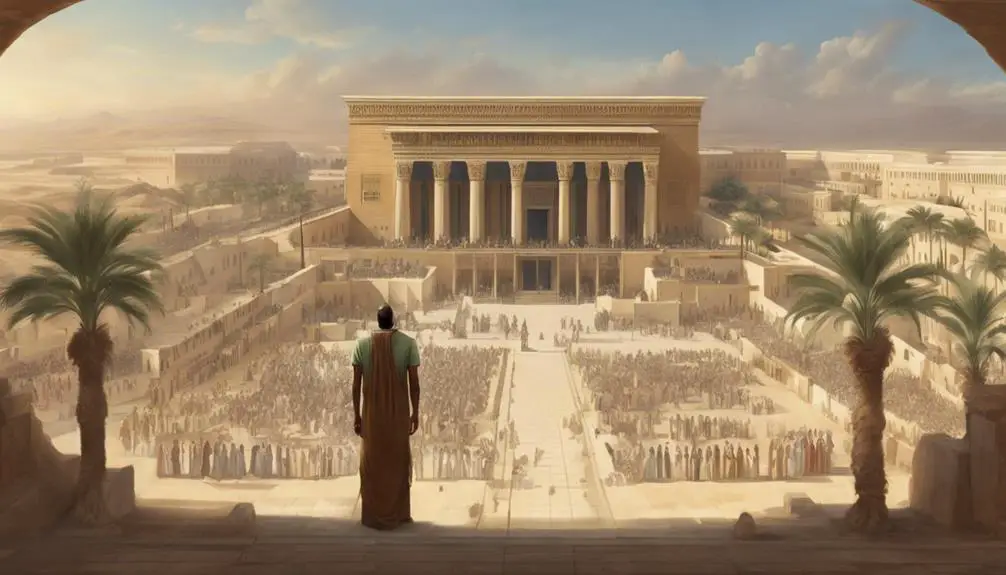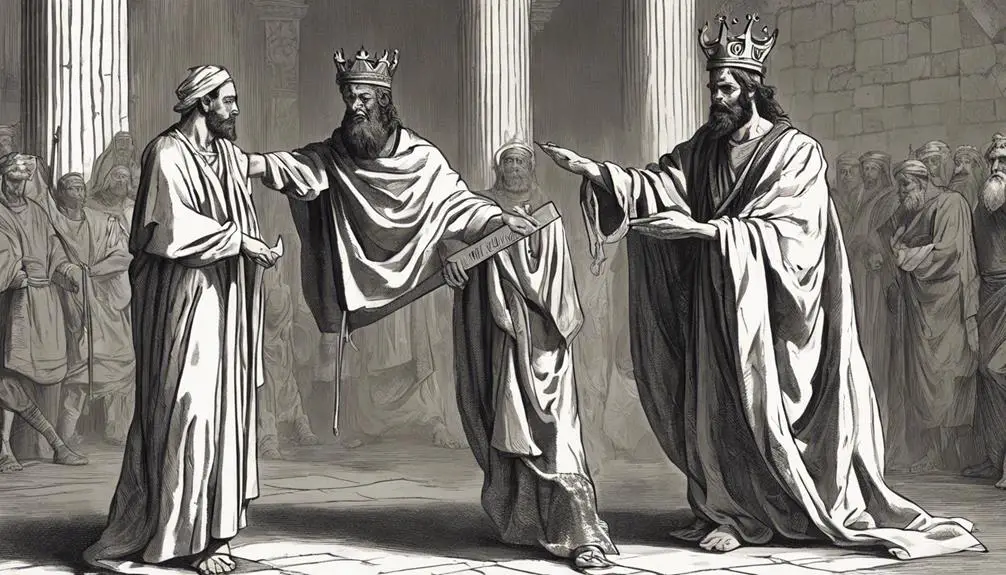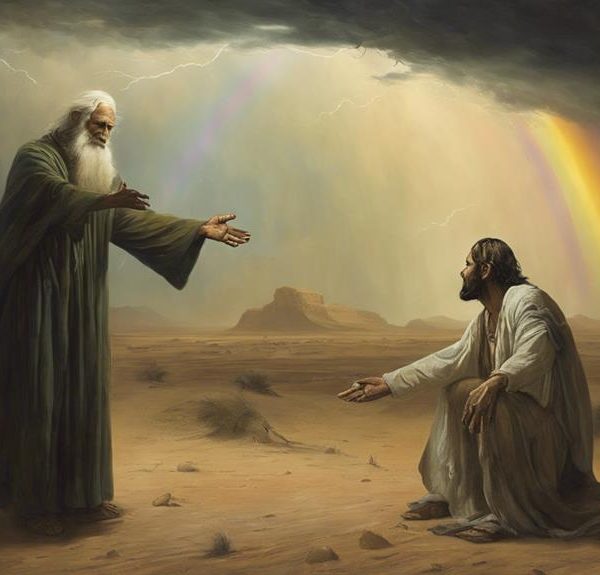Marvel at the pivotal moments in the Bible where two choices altered history, and discover the untold decisions lurking within its ancient pages.

Two Choices in the Bible
Imagine you're sitting in a time machine, ready to journey back to the pivotal moments in the Bible where two choices dramatically altered the course of history.
Consider Adam and Eve in the Garden of Eden, grappling with the decision to eat from the tree of knowledge.
Or reflect upon Moses, torn between the luxuries of Egyptian royalty and the plight of his people, the Israelites.
Yet, these are just the tip of the iceberg.
What other moments of stark choice are hidden within the pages of this ancient tome, waiting for you to uncover?
Key Takeaways
- The decisions of biblical figures like Adam, Eve, and King Saul highlight the severe consequences of yielding to temptation and disobedience.
- The choices made by leaders like Moses and David demonstrate the importance of self-sacrifice, humility, and repentance in leadership.
- The contrasting responses of Saul and David to their sins provide valuable lessons on pride, defiance, and the power of seeking forgiveness.
- Jesus' choice to sacrifice himself on the cross signifies the ultimate act of selfless love, offering humanity redemption and a chance for new beginnings.
Adam and Eve's Fateful Decision

Delving into Adam and Eve's fateful decision, you'll find a pivotal moment in biblical history that highlights the human capacity for choice and the far-reaching consequences it can bear. This saga, set in the idyllic Garden of Eden, is a testament to the human struggle with temptation and the repercussions of yielding to it, thus forming the core of Eden's Temptation.
Eve's Persuasion plays a significant role in this narrative, underscoring the power of influence and manipulation. Eve, beguiled by the serpent, chose to eat from the Tree of Knowledge of Good and Evil, contrary to God's explicit command. This decision wasn't made in isolation but influenced Adam, demonstrating the ripple effect of one's choices.
The consequences were immediate and severe. The blissful innocence was lost, replaced by a harsh awareness of their nakedness and vulnerability. They were banished from Eden, marking the end of their idyllic existence and the beginning of hardship and toil. The repercussions of their choice echo through generations, underscoring the profound impact of our decisions. This narrative serves as a somber reminder of the potential consequences when faced with temptation and the power of persuasion.
Moses' Choice: Egypt or Israelites

Shifting our focus from the Garden of Eden, we encounter another critical juncture in biblical history where Moses, raised in the opulence of Pharaoh's palace, faced a significant choice between remaining in Egypt or leading the Israelites to freedom. This choice, steeped in moral, spiritual, and political complexities, requires further examination.
Moses' leadership was a crucial factor in this decision. Despite his Egyptian upbringing, Moses felt a profound connection to his Israelite roots. This bond instilled in him a sense of duty and responsibility towards his oppressed brethren. His leadership, therefore, wasn't merely a position but a divine calling to deliver his people from bondage.
The Egyptian influence, however, can't be ignored. Moses' formative years in Pharaoh's court exposed him to the power and privilege associated with Egyptian royalty. Yet, he chose to abandon these comforts, thereby rejecting the Egyptian influence that once shaped his life.
His choice signifies a crucial turning point, not just in his life but in the course of Israelite history. It was a choice that required self-sacrifice and courage, illuminating the strong-willed character of Moses and his unyielding commitment to God's purpose. In essence, Moses' decision was a testament to his faith and the power of divine calling.
King Saul's Disobedient Act

Turning our attention to King Saul, his disobedient act offers another profound illustration of choice and its consequences in the Bible. You see, Saul's pride led him to a path of disobedience. He chose to ignore the divine commandment to completely annihilate the Amalekites, opting instead to spare their king and the best of their livestock. His disobedience wasn't a minor oversight; it was a deliberate act rooted in arrogance and self-will.
Analyzing this act, you'd note Saul's pride as the driving factor. He deliberately chose personal gain over obedience to God. His choice, while seemingly benefiting him in the short-term, led to divine punishment. God rejected Saul as king, a dire consequence of his prideful disobedience. Saul's narrative serves as a cautionary tale, illustrating the long-term effects of pride and disobedience.
In a scholarly perspective, Saul's disobedience underscores the biblical teaching that pride precedes destruction. It shows that disobedience, especially when birthed from pride, always leads to divine punishment. Saul's tale is a vivid reminder that personal choices, no matter how appealing, should never outweigh compliance to divine directives. His story is an enduring lesson that disobedience carries severe consequences.
David's Repentance or Consequences

In contrast to Saul's prideful disobedience, David's repentance after his grave missteps exemplifies the biblical teachings on humility and the power of sincere atonement. His path charts a distinct course, demonstrating the profound impact of heartfelt contrition and the transformative power of genuine remorse.
David's humility, a cornerstone of his character, was instrumental in his ability to recognize and accept his wrongdoings. Unlike Saul, who clung stubbornly to his defiant stance, David acknowledged his transgressions openly and sought forgiveness. His heartfelt contrition was a testament to his deep-rooted faith and unwavering belief in God's mercy and grace.
The consequences of David's actions, though severe, ultimately led him to a profound understanding of the importance of repentance. Biblical texts describe David as a man after God's own heart, emphasizing his sincere repentance as a key factor in this designation. His story challenges you to examine your own responses to personal failings. Do you react with stubborn denial, or do you embrace humility and seek repentance?
David's choice of repentance over consequence illustrates the power of humility and the transformative potential of sincerity. His story serves as a compelling reminder of the value of repentance and the profound impact of heartfelt contrition.
Jesus' Sacrifice: Humanity's Salvation

Drawing parallels with David's repentance, let's delve into the ultimate act of sacrifice in the Bible: Jesus' crucifixion, an event that symbolizes the salvation of humanity. The crucifixion's significance lies not only in its historicity but also in its spiritual implications. It represents a turning point in the redemption process, serving as the fulcrum upon which the fate of humanity hinges.
By willingly accepting this brutal death, Jesus became the sacrificial lamb, bearing the weight of humanity's sins. His blood, shed on the cross, signifies the cleansing of sin, offering a path for redemption. His resurrection, however, elevates the narrative from one of despair to hope, underscoring the triumph of life over death.
Your understanding of this event is crucial. It's not just about recognizing Jesus' physical suffering; it's about acknowledging the selfless love that led Him to the cross. This sacrifice wasn't made to create a debt you can never repay but to offer grace, forgiveness, and the chance for a new beginning. Thus, the crucifixion and resurrection aren't just historical events; they're living, breathing invitations to embrace salvation.
Frequently Asked Questions
How Are the Choices Made in the Bible Relevant to Our Current Society?
You're examining how Biblical choices impact our modern world.
The relevance to contemporary society lies in the lessons these decisions teach us.
They offer insights into moral and ethical dilemmas, helping us navigate complex situations.
Their wisdom can guide our societal norms, shaping our collective conscience.
Are There Any Other Notable Figures in the Bible Who Had to Make Significant Choices?
Yes, many notable biblical figures made significant choices.
For example, Abraham's sacrifice is an instance of absolute obedience and faith. He's willing to sacrifice his son, Isaac, when God commands him.
On the other hand, Judas' betrayal of Jesus is a decision driven by greed and fear. His choice leads to regret and despair.
These examples illustrate that our choices often reflect our values and faith, impacting not only us but those around us.
How Does the Bible Guide Us in Making Our Own Personal Decisions?
The Bible provides you with divine guidance and biblical wisdom for making personal decisions. It's not a step-by-step manual, but it offers principles to apply.
Its teachings help you distinguish right from wrong, and its stories illustrate consequences of choices. By studying it, you're equipped to make decisions aligned with your faith.
However, it's crucial to seek God's will through prayer as you interpret and apply these teachings.
What Is the Stance of the Bible on Disobedience and Repentance in Today's Context?
The Bible teaches you that disobedience carries consequences, often painful, leading to personal turmoil and spiritual disconnection. However, it also emphasizes the rewards of repentance, offering forgiveness, restoration, and spiritual growth.
It's not about punishment, but enlightenment and improvement. It urges you to learn from your mistakes, repent, and strive to live a more righteous life. This timeless wisdom is just as applicable in today's context as it was in biblical times.
Are There Any Contradictions in the Bible Concerning Choices and Their Consequences?
You're asking about potential contradictions in the Bible regarding choices and their consequences.
There's a great deal of debate on this topic, particularly around Divine Intervention Contradictions and Biblical Decision Making Paradoxes.
Some argue that God's sovereignty and human free will can seem contradictory. However, it's important to understand the Bible's complex narrative and its teachings on cause and effect.
Conclusion
In conclusion, the Bible presents us with various choices and their consequential outcomes. Adam and Eve's disobedience, Moses' loyalty, Saul's defiance, David's repentance, and Jesus' ultimate sacrifice, all illustrate the profound impact of our decisions. These instances encourage us to make choices aligned with faith and righteousness.
Ultimately, these biblical narratives serve as timeless reminders that our decisions, whether monumental or mundane, shape our lives and the world around us.



Sign up